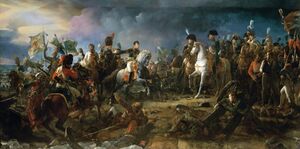Many thanks to our Patrons who cover ~2/3 of our hosting bill. Please join them if you can.
1805
Jump to navigation
Jump to search
1795 < 1796 < 1797 < 1798 < 1799 < 1800 < 1801 <1802 < 1803 < 1804 < 1805 > 1806 > 1807 > 1808 > 1809 > 1810 > 1811 > 1812 > 1813 > 1814 > 1815
 The battle of Austerlitz | |
| Year 1805 |
Events
- March 1 – Justice Samuel Chase is acquitted of impeachment charges by the United States Senate.
- March 4 – Thomas Jefferson is sworn in for a second term as President of the United States.
- March 5 – The New Brunswick Legislature passes a bill to advance literacy in the province, which eventually leads to the creation of public education in Canada.
- April 29 – Rutger Jan Schimmelpenninck is appointed as Grand Pensionary of the Batavian Republic by Napoleon.
- May 26 – Napoleon is crowned King of Italy.
- June 4 - The First Barbary War ends between Tripoli and the United States of America.
- June 13 – Lewis and Clark Expedition in the United States: Scouting ahead of the expedition, Meriwether Lewis and four companions sight the Great Falls of the Missouri River, confirming they are heading in the right direction.
- August 29 – Emperor Franz I of Austria and his council of ministers vote in favor of going to war with France.[1]
- August 31 – British Army General David Baird departs from Cork, leading an expedition to capture the Cape of Good Hope. Their ship arrives on January 4.[2]
- September 21 – King Ferdinand of Naples signs a treaty in Paris agreeing to keep Naples neutral during the war between France and the allied powers.[3]
- September 29 – Admiral Nelson of the British Royal Navy takes command of the fleet off of the coast of Cadiz, in order to counteract the navies of France and Spain.[4]
- October 16–19 – War of the Third Coalition: Ulm Campaign – Battle of Ulm: Austrian General Mack von Leiberich is forced to surrender his entire army to Napoleon, after being surrounded.
- October 21 – Napoleonic Wars: War of the Third Coalition – Battle of Trafalgar: The British fleet, led by Admiral Horatio Nelson, defeats a combined French and Spanish fleet off the coast of Spain; however, Admiral Nelson is fatally shot.
- October 31 – Sweden, led by King Gustav IV Adolf, declares war on France.[5]
- November 7 – The Lewis and Clark Expedition arrives at the Pacific Ocean.
- December 2 – Napoleonic Wars: Battle of Austerlitz – French troops under Napoleon decisively defeat a joint Russo-Austrian force.
- December 26 – The Peace of Pressburg between France and Austria is signed in the Primate's Palace, Pressbury (modern-day Bratislava).
- December 31 – The French Republican Calendar (which featured a 10-day week until 1802) is used for the last time, 8 days after being annulled by Napoleon, with the final official date being "9 Nivôse in Year XIV of the Revolution".[6]
Date unknown
- Napoleon orders his soldiers to be vaccinated.
Events
| Event | Start | End | Description |
|---|---|---|---|
| Napoleonic Wars | 1803 | 1815 | A global series of conflicts fought between the France under First Consul and Emperor of the French, Napoleon Bonaparte, against a fluctuating array of European coalitions, to a large degree directed by Britain. |
A Birth
| Title | Born | Place of birth | Died | Summary | Description |
|---|---|---|---|---|---|
| Alexander Burnes | 16 May 1805 | Scotland Montrose | 2 November 1841 | Diplomat Spook Explorer | UK "spymaster" diplomat |
Many thanks to our Patrons who cover ~2/3 of our hosting bill. Please join them if you can.
References
- ↑ Kinley Brauer and William E. Wright, Austria in the Age of the French Revolution, 1789-1815 (Berghahn Books, 1990) p11
- ↑ "Baird, David", in A New General Biographical Dictionary, Volume 3, ed. by Hugh James Rose (T. Fellowes, 1857) p20
- ↑ Tales of the Wars; Or, Naval and Military Chronicle (William Mark Clark, 1836) p329
- ↑ The Englishman's library: comprising a series of historical, biographical, and national information (Charles Knight, 1824) p165
- ↑ H. Arnold Barton, Scandinavia in the Revolutionary Era: 1760–1815 (University of Minnesota Press, 1986) p267
- ↑ Thomas Carlyle, The French Revolution (Courier Corporation, 2012) p210